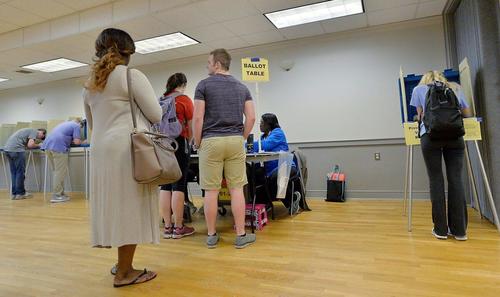Authored by Zachary Stieber via The Epoch Times,
Two North Carolina judges on Friday struck down a law that required identification to vote, alleging it “was enacted with the unconstitutional intent to discriminate against African American voters.”
North Carolina House Speaker Tim Moore gavels in a session in Raleigh, N.C., on April 30, 2020. (Gerry Broome/AP Photo)
The law was enacted in violation of the Equal Protection Clause in North Carolina’s Constitution, the majority of the panel said. The clause says that nobody shall be denied equal protection of the laws nor shall anybody be subjected to discrimination by the state due to race.
Defendants, including North Carolina House Speaker Timothy Moore, failed to show that racial discrimination was not a substantial or motivating factor behind enactment of the law, Superior Court Judges Michael O’Foghludha and Vince Rozier Jr., both Democrats, wrote in a 102-page ruling permanently blocking the measure.
“Other, less restrictive voter ID laws would have sufficed to achieve the legitimate nonracial purposes of implementing the constitutional amendment requiring voter ID, deterring fraud, or enhancing voter confidence,” they said.
The law in question, Senate Bill 824, was enacted after a majority of voters in North Carolina approved it as a constitutional amendment in 2018. Before that, the Republican-controlled state legislature passed the bill and overrode a veto from North Carolina Gov. Roy Cooper, a Democrat.
According to previous court rulings, plaintiffs challenging a law in the state must show that discrimination was a “motivating factor” in passing a law, the pair of judges said in their majority decision. That puts the burden on defendants to prove that the law “would have been enacted without this factor,” they added, quoting from a North Carolina Court of Appeals ruling from last year, Holmes v. Moore.
Jabari Holmes and five other voters in the state sued over the law on the same day the legislature overrode Cooper’s veto, noting that a previous voter identification requirement was invalidated by the U.S. Court of Appeals for the Fourth Circuit because it was alleged to be intentionally racially discriminatory, in a decision upheld by the U.S. Supreme Court.
The bill “unconstitutionally and unjustifiably burdens the right to vote of Plaintiffs and similarly situated registered, qualified North Carolina voters who lack acceptable photo ID when they go to the polls and are subject to a complex process to vote,” the group of voters said in their complaint.
Moore and other defendants charged that the suit should be dismissed because, they said, the law did not violate the state Constitution.
Judge Nathaniel Poovey, third judge on the panel, offered a dissenting opinion in which he highlighted how the law was approved by the voters of the state.
“Presenting some form of identification is a task we must perform quite frequently in everyday life. Adding more familiarity to the process of casting a vote increases the level of certainty in the electoral process. And doing so by requiring the presentation of photographic identification ensures each person offering to vote is who they proclaim to be, thereby increasing confidence in the outcome of each election,” Poovey, a Republican, said.
Voters are seen during the North Carolina primary elections at the Pullen Community Center in Raleigh, N.C., on March 15, 2016. (Sara D. Davis/Getty Images)
The evidence showed that “no registered voter in this State will be precluded from voting by the identification requirements in this law,” he added.
The Southern Coalition for Social Justice, which represents the plaintiffs in the case, said in a statement that the ruling “Is a testament to the overwhelming evidence, including compelling stories of disenfranchisement from voters themselves, which highlighted how the state’s Republican-controlled legislature undeniably implemented this legislation to maintain its power by targeting voters of color.”
Sam Hayes, general counsel for Moore, the North Carolina House speaker, said in a statement that “Once again, liberal judges have defied the will of North Carolinians on election integrity.”
“This fight is far from over. We look forward to appealing this partisan ruling on behalf of the people of North Carolina,” he added.
Two other lawsuits against the bill are also being considered by courts. A federal suit brought by the National Association for the Advancement of Colored People is set to go on trial in January 2022; a separate suit brought on the state level by the association is awaiting a decision on appeal to the North Carolina Supreme Court.



